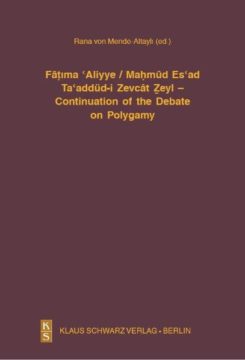One of the most important, earliest and most thorough discussions on the sense or nonsense of polygamous practice involved the pioneer of Ottoman feminism, Fatma Aliye (1862-1936) and the traditionalist and jurist, Mahmut Esat (1855-1918). Their views were published in a three-chapter book entitled Ta’addüd-i Zevcat Zeyl (Continuation [of the Debate] on Polygamy) in 1316/1898-99 in Istanbul.
The first chapter contains Fatma Aliye’s critical reaction to some articles by Mahmut Esat, which he had published in the newspaper Ma’lumat. The second chapter is Mahmut Esat’s answer to Fatma Aliye’s views and questions concerning polygamy, and the third contains his reaction to Ismail Gaspirali’s (1851-1914) attack on polygamy.
Ta’addüd-i Zevcat Zeyl is also a reaction to the image of the oriental woman, predominant in the West, and it fights the Western notion that the Ottomans were polygamous and that Islam was responsible for this.
Ta’addüd-i Zevcat Zeyl is a polemical work, written as a dialogue. The edition presented here consists of a modern Turkish rendition of the Ta’addüd-i Zevcat Zeyl, a transcription of the original, and a facsimile of the work. Problems of Ottoman syntax and grammar have been resolved in a way designed to make the text better understood in modern Turkish.
- Veröffentlicht am Montag 13. September 2010 von Klaus-Schwarz-Vlg
- ISBN: 9783879973767
- 177 Seiten
- Genre: Geschichte, Neuzeit bis 1918, Sachbücher
